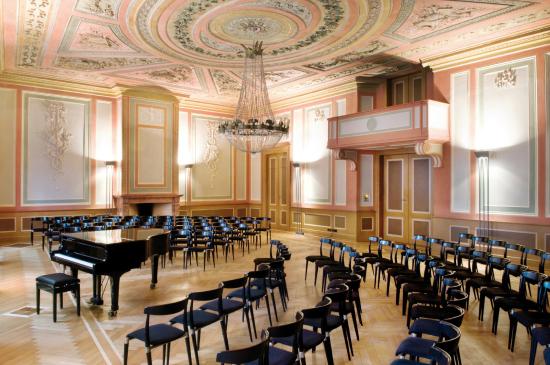Handover of baton
Aita Biert and Sebastian Mäder were elected to the Board of Directors at the DM on March 16. They replace Ines Hübner, who had already announced when she took office in 2023 that she would only be available for one year.
A special feature of the SMPV is its structure: it consists of fifteen sections, which are independent associations that set up different programs of activities and offer different services. They can put forward their ideas for the development of the central association in the form of proposals to the DM. At the twice-yearly Presidents' Conferences, their Presidiums discuss which trade union and cultural policy topics the Central Committee should address, which services it should develop for members, how it should organize member recruitment and how it should communicate.
When discussing the association's strategy and planning extraordinary events, the Board must therefore always remember to take into account the different needs of the various sections.
It is ideal that the composition of the Board is as heterogeneous as possible in terms of age, experience, professional situation and special interests, and the Board is therefore very much looking forward to working with the new Board members:
Aita Biert knows all facets of (music) teaching professions from her own experience. She has trained as a primary school teacher, piano teacher, social worker and music therapist, has worked as a piano teacher at various music schools, was head of a music school in the Lower Engadine and has always also worked as a social worker. Today she works as an independent music therapist and piano teacher, is a member of the cantonal parliament of Graubünden and is also a board member of the Graubünden Association of Singing and Music Schools. She wants to make a strong commitment to recruiting members, as she knows from experience how important communities and interest groups are, and she is appalled that so many music teachers do not belong to a professional association. She is keen to use her political contacts to achieve political goals.
Sebastian Mäder is very interested in the development of music education in Switzerland and would particularly like to advocate for the expansion of skills in pop/rock/jazz. He would like to initiate a discussion among music educators about what music education should be like in the future and what role the SMPV could play in this.
He completed his music education studies as a drummer at the ZHdK and will soon complete his music management studies at the HKB. Among other things, he teaches a drumset class, heads the pop/rock/jazz department at the Kilchberg-Rüschlikon music school and teaches skills in popular music at the HKB.
Assessments by our departing member of the Executive Board
Dear Ines, thank you very much for supporting us on the Central Committee despite your busy professional schedule. We already miss your intelligent, well-considered votes, and we have benefited enormously from your extensive experience in the trade union sector, which you gained in the CLA negotiations for the Musikkollegium Winterthur, as a long-standing employee representative and also in your work for the SMV.
How would you assess the situation of the SMPV based on your experience of working on the Central Committee? In your opinion, what is working well and where are there areas of improvement?
Ines Hübner: In the service sector, the SMPV is very well positioned and very modern, and highly competent work is also being done there. I would mention our two mediation platforms, for example.
On the other hand, I think that the SMPV should significantly increase its presence at music schools and make music school teachers aware that it is available to represent their interests - e.g. also in CLA negotiations.
I can't understand why only one music school has a CLA, why the teachers don't make an effort to negotiate such a contract for their music school. A CLA creates transparency, ensures equal employment conditions for all and creates a forum for discussion at an inter-collegiate level and up the hierarchy for an exchange on an equal footing.
MW: No member responded to the interview with Mr. Munzinger on the subject of CLAs. Are music school teachers simply doing too well to need a CLA?
IH: I don't want to say that. There seems to be this perception based on a "patron-centered" view of the world: "Everything works, my music school management takes care of me." But for fear of upsetting this ideal world view, people don't dare to say or question anything. This means that employees go into hiding if there are minor problems and sit them out, and if there are major problems and they have to defend themselves, they risk losing their job. In the spaces provided by a CLA, such problems can be discussed democratically without fear.
Every music teacher is a specialist in their field. Thanks to the democratic structures offered by a CLA, everyone can contribute their specialist knowledge, which is ultimately a huge benefit for the whole music school.
But I know it's difficult to get people involved in trade union work. Creative, new solutions are needed. I see this as a very important task for the SMPV!








